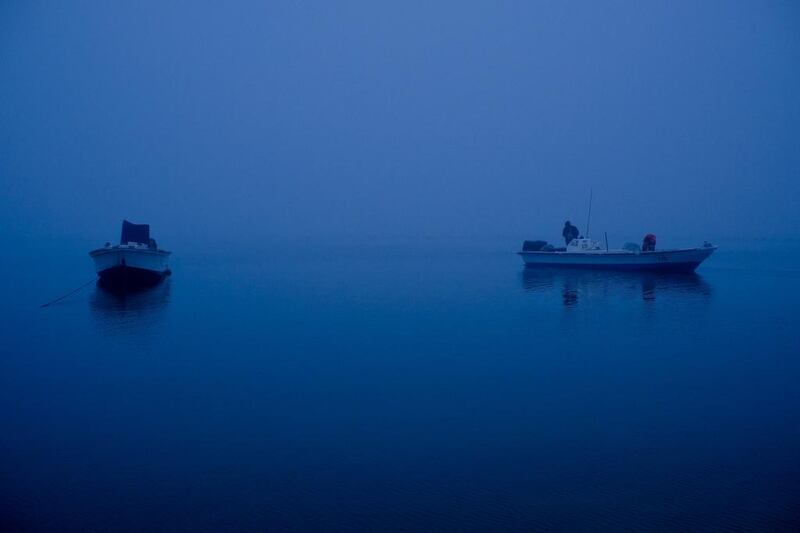UMM AL QUWAIN // It is 5am in a fishing creek on the edge of the Arabian Gulf.
The sun has yet to rise, but Mahalla Mohammed has just spent 13 hours at sea and sailed more than 30 kilometres from his berth.
Mr Mohammed, 60, watches as his crew unloads several buckets of fish.
“All night we fish,” says the Emirati. “It was not a successful catch.”
The four-month ban to protect stocks began last month. While these restrictions are tough, they are also viewed as essential to prevent the depletion of stocks and keep the ancient tradition alive.
Mr Mohammed has spent 45 years working in Umm Al Quwain.
“Some parts of the law are tough on business. Very difficult. There is less business now but the income can still be good,” he says.
Six boats line the port. It is a quiet day, he says. More than a 100 can moor in the busy months.
The ban on fishing, which will be lifted in July, is put in place to stop young fish being caught.
It came after a study that showed most fish in the area spawned between March and July.
Sultan Saif, a 32-year-old Emirati fisherman, believes the municipality has made the right step banning fishing inside the creek.
“Inside you have small, small babies and you have to protect them.”
However, fishing is a hard trade and the rules can make it tougher, he says.
Other requirements have been put in place recently to protect dwindling fish stocks, he says.
Fishermen now have to choose between using nets or metal cages, known as gargoor, as the Ministry of Environment will licence them only for one or the other, he says.
There are also specifications about some fishing practices using the gargoor, which are deemed harmful to the habitat and seabed.
“This is very hard work. Everybody thinks fisherman have a lot of money, but no,” says Mr Saif.
Emirati Ahmed Yousef, 52, is about to set out for the morning.
Between March and June he simply goes to other fishing spots.
The longer journeys do not faze him and he believes the ban is essential. “Fish needs to replenish,” says Mr Yousef, a fisherman of more than 30 years.
Ahmad Youssef Hassan Al Hammadi has also been a fisherman for more than 30 years.
“Along the coast, most people want to fish and have inherited the craft from their ancestors,” he says. “It is a type of activity, but also a sport and a means to make a living.”
As the number of fisherman increased and equipment became more advanced, the catches have decreased, he says.
Mr Al Hammadi is in favour of fishing being prohibited during the breeding season.
“Fish populations should be protected to allow them to proliferate and grow,” he says.
Abdulla Rashid, a 40-year-old Indian, has been a fishmonger in UAQ for 10 years and also supports the ban.
“This time of year the fish they get pregnant and they need to be left alone,” he says. “The ban is no problem for us.”
The four-month period allows stocks to replenish and as a trader, that means he can offer his customers better quality, says Mr Rashid, of Al Shahi Sale Shop.
Salah Abdalla Al Rayssi, director of fisheries at the Ministry of Environment and Water, says the ban aims to give fish a chance to breed, rebuild and continue their life cycle.
“This is done by banning fishing in certain areas, which contributes to protecting and developing the country’s fisheries,” he says.
Fish stocks have plummeted over recent years.
In 2002 fish stocks were estimated at 1,735kg per square kilometre. By 2011 they had dropped to 529kg per square kilometre.
In 1975, stocks were estimated at 9,100kg per square kilometre.
jbell@thenational.ae





